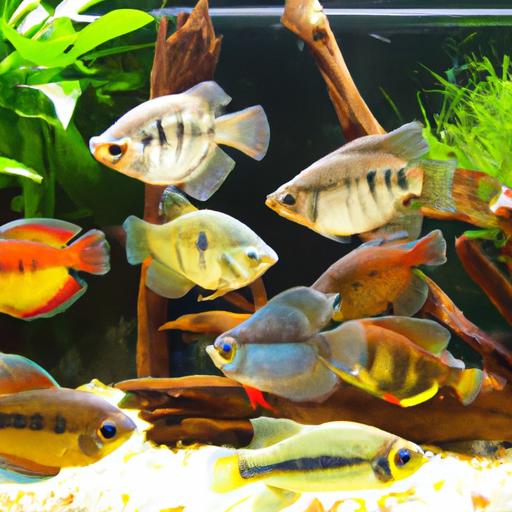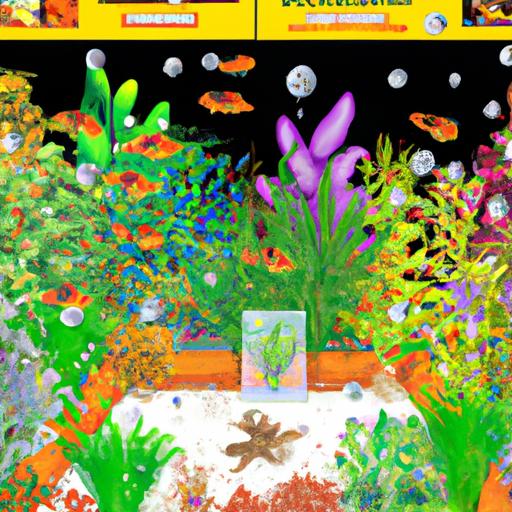
Keeping a Happy School of Tetra Fish
Discover the secrets to keeping a happy school of Tetra Fish. Learn about tank size, water conditions, diet, and compatibility for a thriving aquarium.
Introduction
When it comes to maintaining a thriving aquarium, few things are more rewarding than keeping a happy school of Tetra Fish. These vibrant and active fish species can bring life and beauty to any tank. However, ensuring the well-being of your Tetra Fish community requires careful attention to their needs. In this article, we will explore the essential factors for keeping a happy school of Tetra Fish, providing you with the knowledge and guidance to create a thriving aquatic environment.

Factors for Keeping a Happy School of Tetra Fish
To maintain a healthy and content school of Tetra Fish, several factors should be considered:
1. Proper tank size and environment
Providing an adequate living space is crucial for the well-being of your Tetra Fish. These energetic swimmers require ample room to thrive and exhibit their natural behaviors. A suitable tank size will depend on the specific Tetra Fish species you choose to keep. Generally, a minimum of 10 gallons is recommended for a small school of Tetra Fish, but larger tanks are preferred for larger species or larger groups. Ensure the tank is properly decorated with plants, rocks, and hiding spots to mimic their natural habitat and provide a sense of security.
2. Appropriate water conditions and temperature
Maintaining optimal water conditions is vital for the health and happiness of your Tetra Fish. Regularly test the water parameters such as pH, ammonia, nitrite, and nitrate levels to ensure they are within the appropriate range. Tetra Fish thrive in slightly acidic to neutral water, with a pH range of 6.5 to 7.5. Consistently monitor and regulate the water temperature, as Tetra Fish prefer temperatures between 72 to 78 degrees Fahrenheit (22 to 26 degrees Celsius). Investing in a reliable aquarium heater and thermometer is essential to maintain a stable and comfortable environment for your Tetra Fish.
3. Ideal diet and feeding habits
Feeding your Tetra Fish a balanced and nutritious diet is essential for their overall well-being. Tetra Fish are omnivorous, meaning they consume both plant matter and small invertebrates. High-quality flake or pellet food specifically formulated for Tetra Fish should serve as the staple diet. Supplement their diet with occasional live or frozen foods such as brine shrimp, daphnia, or bloodworms to provide additional enrichment and essential nutrients. It’s important to feed your Tetra Fish in small portions multiple times a day, mimicking their natural feeding habits and preventing overeating.
4. Compatibility with tank mates
Creating a harmonious community within your aquarium involves choosing tank mates that are compatible with Tetra Fish. While Tetra Fish are generally peaceful, some species may exhibit fin-nipping behavior, especially if they feel crowded or threatened. Avoid keeping them with aggressive or large fish that may intimidate or harm them. Instead, opt for peaceful and similarly sized species that share similar water parameter requirements. Researching the compatibility and behavior of potential tank mates beforehand will help ensure a peaceful coexistence.
Frequently Asked Questions (FAQs)
What is the ideal tank size for a Tetra Fish school?
The ideal tank size for a Tetra Fish school depends on the specific species you choose to keep. As a general guideline, a minimum of 10 gallons is recommended for a small school of Tetra Fish. Larger species or larger groups may require larger tanks to accommodate their needs adequately.
How often should I test the water parameters?
It is crucial to regularly test the water parameters in your Tetra Fish aquarium. Ideally, you should test the water parameters weekly, especially for pH, ammonia, nitrite, and nitrate levels. Consistent monitoring of water conditions will allow you to address any issues promptly and maintain a healthy environment for your Tetra Fish.
What type of diet is best for Tetra Fish?
Tetra Fish are omnivorous and require a balanced diet. High-quality flake or pellet food specifically formulated for Tetra Fish should serve as their staple diet. Supplement their diet with occasional live or frozen foods such as brine shrimp, daphnia, or bloodworms to provide variety and essential nutrients.
Can Tetra Fish coexist with other fish species?
Tetra Fish are generally peaceful and can coexist with a variety of fish species. However, it is crucial to choose tank mates that are compatible in terms of temperament, size, and water parameter requirements. Avoid aggressive or large fish that may harm or intimidate the Tetra Fish.
Conclusion
In conclusion, keeping a happy school of Tetra Fish requires attention to various factors, including providing an appropriate tank size and environment, maintaining optimal water conditions and temperature, offering a balanced diet, and ensuring compatibility with tank mates. By following these guidelines, you can create a thriving and harmonious aquatic community for your Tetra Fish. Remember, a happy school of Tetra Fish not only brings joy and beauty to your aquarium but also serves as a testament to your dedication as an aquarist.
For more information on keeping colorful Tetras in your aquarium, nurturing a healthy community of Danio Fish, or exploring unique varieties of Rasbora Fish, visit UbiPets, UbiPets, and UbiPets.































